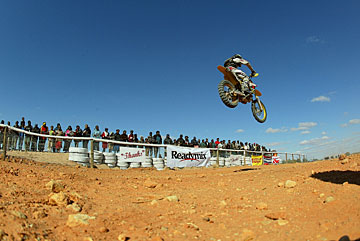
Bikes fly up the last hill before the finish
By the time they reach the river, the bike riders in the Finke Desert Race have spent two, three, four hours in a world of dirt. They've gritted their teeth on it, been blinded by it, got caked in it. They've hurtled across 230 km of it, through wheel-choking sand drifts, over chest-deep corrugations, or whoops, that jackhammer their bikes and backs for miles. Now, one by one, they fly over the bank and hit the river. Splat! Up spurts a plume of white sand. The Finke, oldest river in the world, is as dry as the desert around it.
"It's one in a million that there's water in the river," says Ian Jordan, a gruff-voiced giant with a white-blond ponytail who's been coming to Finke for a decade. He used to compete in the race; now he's an official, overseeing the 446 bike entries (there are 80 cars and buggies, too). Water flows here only after rain, Jordan says, and then for only as long as it takes to sink into the sand. But you can be unlucky. "A few years ago a guy was on a practice run, and he came around the bend and, "Oh, s___, there's water in it.' And went straight in."
Water is flowing freely at the finish line, a kilometer beyond the river. The moment they dismount, the riders take off their helmets and pour bottled water down their throats. Then they take off their hard plastic breast- and backplates, unclip their wide kidney belts, peel down the tops of their Robocop padded bodysuits, and pour more water over their chests and arms. No champagne yet, though — the ordeal isn't over.
Thirty years ago, when Alice Springs dirt-bikers started the race as something to do on the Queen's Birthday long weekend, they called it simply There and Back. Finke — by which locals mean both the river and the Aboriginal community (pop. 200) beside it — is only halfway. But in Australia's roughest off-road rally, just getting this far is a victory. Forty-one bikes and 29 cars won't make it today, defeated by crashes or by failures mechanical or mental. Tomorrow, another 59 bikes and 14 cars won't complete the ride back. "This is the crazy race," says Ben Grabham, who clearly revels in crazy. He'll not only get back intact but win the bike event.
"When you let the clutch out," says Jordan, "you get a drug nobody can give you — adrenaline. People break their wrist, shoulder, fingers and don't feel a thing." Until they cross the finish line. "I'm pretty buggered," one rider admits. "It takes an hour for your head to stop wobbling," says his mate. Off-road warriors are used to pain. They talk as often of knee reconstructions and "heavy-duty Voltaren" as of sprockets, diffs and gearboxes. Brad Williscroft was second in to Finke, but he's feeling more agony than elation. "It feels like my collarbone's broken," he tells a fresh-faced volunteer in the first-aid tent. When she gently lifts his arm, he chokes back a scream. He already has a broken finger, held together by wires. Tomorrow a crash will wreck his knee and take him out of the race.
On the other side of the finish line, a local boy in a rugby shirt stands holding the handlebars of a red-and-white bike as if minding a horse. The rider is in the community clinic, he says. "He hurt his back. He's in big pain." Barefoot kids gather round, joined by an elderly woman in a floral skirt. She raps her knuckles on the bike's seat. "Two-fifty cc," she says approvingly. "That's a powerful motorbike."
Chad Duncan's had a good race. His regime of sit-ups, push-ups and chin-ups — "a lot of forearm and back work" — is paying off. "I feel great," he says with a grin, his face white inside the dust-stenciled outline of his goggles. "The bike's an absolute rocket." At 23, Duncan is on his fifth Finke. He didn't finish his first two attempts; tomorrow he'll ride home a winner in his 200-cc class. "Today was magic," he says. "On the whoops you get tired, but once that was over I felt really energized." He's a bit sore, but it's nothing a good soak won't fix.